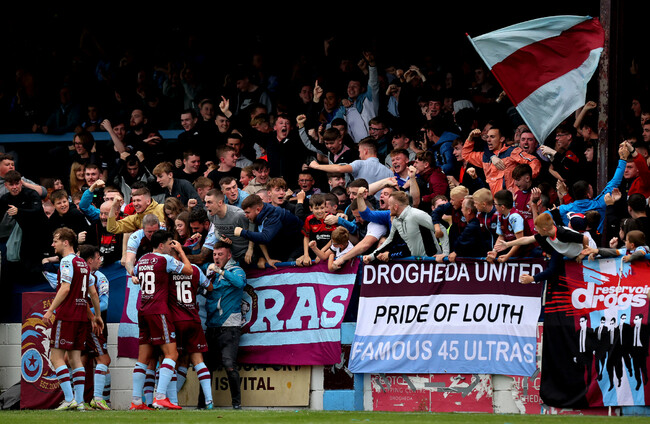THE START OF the phone call comes with an instruction from Kevin Doherty.
“Don’t worry if you hear dogs barking or people shouting at me, we can still carry on,” the Drogheda United manager says.
Earlier this morning he was on his round as a postman in Artane in north Dublin. Thoughts of tomorrow night’s visit of the Premier Division champions were swirling around his head.
“And what have I got to deliver today? Shamrock Rovers membership packs. There is no escape,” he laughs.
“I know some of the lads in the area too, so I will be getting a bit more slagging before the match.”
It would be unfair to say he is speaking during his day job; this is simply the one that can pay the bills and ensures there is a roof over his family’s head.
Being in charge of Drogheda, one of only two part-time clubs remaining in the Premier Division, can still be all-consuming, especially on a week when Stephen Bradley’s side come to Louth.
“Time management is absolutely vital,” Doherty adds.
“I would love to be in on a Saturday, Sunday, Monday morning after a game, go through bits with players, let them recover with us, but I know it’s not feasible. The players need their rest.
Those extra couple of hours in bed will do more for them and be worth more for them than coming in, maybe being in the pool for 30 minutes here. It’s about getting as much out of everyone as possible.”
A case in point was the build up to their season opener last week – a credible 0-0 draw away to Shelbourne – when Doherty and his assistant, Daire Doyle, just happened to be working close by each other.
“He’s around the corner reading gas metres so we’re talking through stuff, figuring out how things will work. You have to make it all count.
“I don’t have full control of my players. I mean, no one ever has control over another person, but one of them could come to me and tell me his boss says he has to work on a certain night so he won’t be available.
“They all want to play football, that’s their priority, but when you’re part-time there will be those issues, although the number who would be [part-time] at our level is decreasing all of the time.”
Bluntly, this is why in their current guise, Drogheda versus Shamrock Rovers is the kind of fixture that no one wants to see in the League of Ireland’s top flight.
Outside investment is a necessity if they are to join the full-time ranks of their rivals in the top flight, something the club have been open about over the last number of months as they seek to entice such parties.
UCD, the other part-timers, are a major outlier given their model as part of the university, but with the top two in the First Division – Waterford and Galway United – also full-time, the net is closing in.
Mistakes of the past, when the club entered examinership in 2008 having lifted the FAI Cup in ’05 and Premier Division in ’07, won’t be made again, especially when basic standards in contracts are now being established.
For the start of this campaign, a minimum wage for players was introduced. On a sliding scale dependent on age, it starts at €430 per week for full-time and €130 for part-time, with clubs also having the option to register players as amateurs and simply pay expenses.
“The reality of where Drogheda are right now, they will have to change if they don’t want to be relegated soon,” Stephen McGuinness, the head of the Professional Footballers’ Association of Ireland (PFA Ireland), adds.
“But they know that, and they have been run responsibly because of that. They are not offering players what they can’t give and then running into trouble, so you have to respect that. The club know they need that investment to keep up.
The whole league is pointing towards full-time football. Financially not every club can do that, so you have to respect the model of the clubs who realise that and want to remain sustainable.
“Ultimately, where the league needs to go, and where it is going, is full-time. In the next couple of years we will have 10 full-time professional clubs, and it will be for everyone to make sure it remains sustainable.”
Doherty continues to pound the pavements of north Dublin, arriving at the door of an uncle of one of his most important players, Evan Weir, who also works as an electrician.
Doherty makes some small talk and then takes up McGuinness’ point about the future of the league.
“Absolutely, 100 per cent that is the way it’s going with full-time football, and rightly so. Our game is sold out tomorrow. You see the excitement around the place the last few years and the place is absolutely hopping.”
Wins over Rovers and local rivals Dundalk last season crystalised that potential. “The time is now, you can just see it: the demographic and the profile of fans, kids coming, families. It’s part of the community.
“Clubs have more of an identity now.”
Yet this fixture between two clubs on the opposite end of the scale show lines are still blurred.



